Chairpersons and CON, EDC, VER commissions members to be elected at FIDE GA in Budapest

Dear National Federations, Dear Chess Friends, In accordance with the FIDE Charter and the FIDE Electoral Rules, the elections of the Chairpersons and members of the Verification Commission, Ethics and Disciplinary Commission and Constitutional Commission will take place at the FIDE General Assembly, on September 21, 2024, in Budapest, Hungary. We would like to kindly remind you that the candidatures for the Chairmen and the Members of the Verification Commission, Ethics and Disciplinary Commission and Constitutional Commission should reach the FIDE Offices by August 21st, 2024, 6 PM CET. Please use the following link to the Congress website General Assembly – 2024 – FIDE Congress 2024, where the relevant documents (requirements, application and nomination forms) can be obtained under General Assembly.
FIDE EDU “Preparation of Teachers” course in Budapest, Hungary, announced

Dear federation colleagues, Given the growing interest in the FIDE EDU “Preparation of Teachers” courses, we are excited to announce the 18th in-person POT course, which will be held during the 45th Chess Olympiad. Are you an aspiring or current chess educator? Prepare to enhance your chess teaching skills and earn the prestigious FIDE Schools Instructor Title at an inspiring event in Budapest, Hungary! Course Details: Dates: September 15-16 & 20-21, 2024 Location: Budapest, Hungary Seminar Language: English This exceptional 4-day seminar is an ideal opportunity for teachers, chess educators, beginner and advanced players with basic chess knowledge, and anyone with experience working with children. Engage in hands-on activities designed to integrate chess into academic settings while fostering essential 21st-century skills such as critical thinking, creativity, communication, and collaboration. Meet Our Expert Lecturers: Rita Atkins, WIM, Secretary of the FIDE Chess in Education Commission (Hungary) Anzel Laubscher, WIM, FIDE Instructor, and FIDE EDU Commission Member (South Africa) Registration Details: E-mail to register: edu.courses@fide.com Registration deadline: September 10, 2024 Fees: Seminar Fee: 150 EUR Title Fee: 50 EUR As an added benefit, successful candidates will receive lifelong access to the OPENING MASTER PREMIUM chess databases. Space is Limited—Only 30 Spots Available! We look forward to welcoming you to Budapest for a transformative educational experience!
FIDE WGP Tbilisi: Miraculous save by Nana Dzagnidze in Round 4
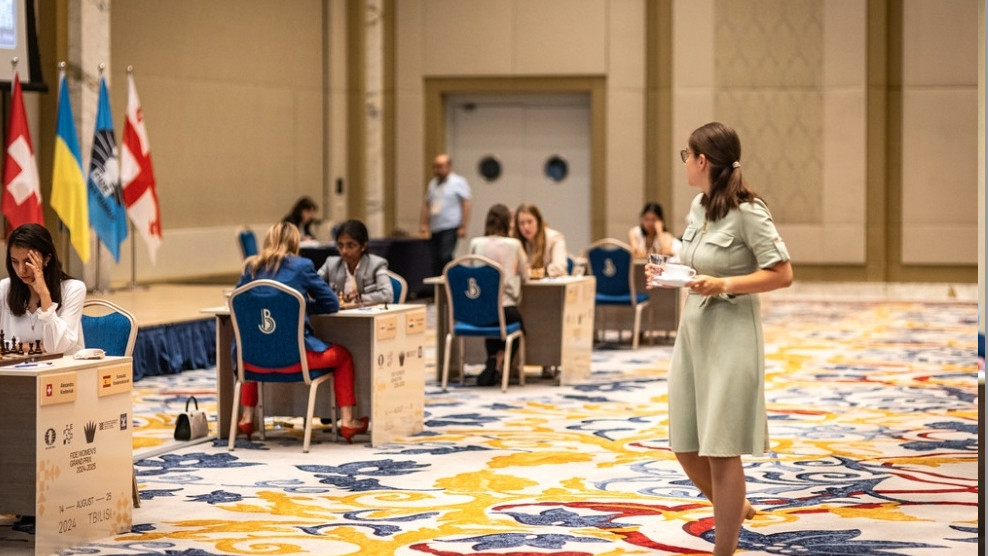
Georgia’s Nana Dzagnidze made a spectacular comeback from a completely lost position against Anna Muzychuk in a game that lasted four and a half hours and 102 moves. Meanwhile, Alexandra Kosteniuk capitalized on Sara Khadem’s error in time trouble, finding a two-move combination that secured her victory. With 2.5 points out of four, Kosteniuk joined the leaders Assaubayeva and Tsolakidou, who drew their games Round four of the Women’s Grand Prix in Georgia ended in dramatic fashion. In a tense encounter, Nana Dzagnidze managed to save a seemingly lost game against Anna Muzychuk in an unexpected twist of events. Muzychuk surprised Dzagnidze by playing a line in the French Defense she had not prepared for, and an early imprecision by Dzagnidze cost her a pawn. Although she had chances to maintain equality, a time-trouble decision to sacrifice a bishop appeared to seal her fate. Despite this, Dzagnidze refused to give up without a fight. “I tried giving as many checks as I could and then planned to resign,” she said in an interview immediately after the game. Fortune favored her when Muzychuk, under pressure, made a critical error on move 78 by pushing her a-pawn to the seventh rank, turning what should have been a win into a dead draw. Now it was Muzychuk who found herself in desperate time trouble, but she could achieve nothing more than half a point. “I feel relieved. After drawing three games where I was winning in two and better in one, this feels like payback,” Dzagnidze said. She is supported at the event by her brother, a tennis coach with little chess experience, who sat through the entire round, cheering her on. Alexandra Kosteniuk also scored an important point today. Sporting earrings resembling a chessboard, the former Women’s World Champion defeated Sara Khadem in the Scotch Game. Khadem sacrificed a pawn but had enough compensation to keep the position balanced. However, a mistake on move 31 in time trouble led to a swift defeat in just two moves. With this victory, Kosteniuk joined the leaders with 2.5/4, while Khadem, with just half a point, finds herself alone at the bottom of the standings. In a sharp Najdorf Sicilian, Mariya Muzychuk launched an aggressive kingside attack against Stavroula Tsolakidou. After Tsolakidou’s weakening move 21…g6, Muzychuk gained a strong position, with better control of the center and more active pieces. However, a misstep with 26.Na4? allowed Tsolakidou to equalize, leading to a series of exchanges that resulted in a rook endgame. Despite being a pawn up, Muzychuk was unable to convert her advantage, and the game ended in a draw. Tsolakidou now has 2.5 points out of four, while Mariya Muzychuk has two points. Alina Kashlinskaya and Bibisara Assaubayeva drew their game after around two hours of play, concluding in just 21 moves. Both players chose a sharp line in the King’s Indian Defense. In the end, Kashlinskaya had a slight initiative and an extra pawn but opted not to press further, leading to a draw. After four rounds, Bibisara has 2.5 points, while Kashlinskaya is on two. Lela Javakhishvili and Vaishali Rameshbabu drew their game in the Queen’s Gambit Declined. Despite lasting 46 moves and four and a half hours, the game remained balanced throughout, with neither side gaining a significant advantage. Both players are on two points. Standings after Round 4 Here follows a closer look at the games of round four of the Women’s Grand Prix in Tbilisi: Alexandra Kosteniuk – Sarasadat Khademalsharieh Alexandra Kosteniuk faced Sara Khadem as White in the Schmidt Variation of the Scotch Game. Khadem held her ground well against Kosteniuk for most of the game. Here, Khadem spent around thirty minutes contemplating her next move. She correctly decided to sacrifice the c7 pawn and launched a pawn advance with 15…h5, creating an escape route for her king. After 16.Qxc7 Bd5, the position remained even, with White a pawn up but Black having enough compensation to hold. However, Khadem faced one significant challenge: she was running low on time. Sensing an opportunity, Kosteniuk continued to pile on the pressure, forcing Khadem into tough decisions. Khadem managed to hold until move 31. The best defense for Black was 31…Qf6, or even moving the king to h7 with an equal position. Instead, Khadem played 31…f6??, after which Black’s position collapsed. Kosteniuk quickly found the winning combination: 32.Qa7+ Bf7 33.Bxg6!! After 33…Qxg6, 34.Rg1 would follow, and the black queen would be lost. Even a counter-sacrifice on h2 wouldn’t save Black: 33…Rxh2+ 34.Kxh2 Qh6+ 35.Kg2 Qxg6+ 36.Kf1 Qh5 37.Qg1+ and White would remain safe. With no way out, Sara Khadem resigned. Lela Javakhishvili – Vaishali Rameshbabu In the Queen’s Gambit Declined, the two players engaged in a long, steady game marked by positional maneuvering rather than drama. By move 22, they entered a rook and knight endgame. Javakhishvili offered a threefold repetition, but Vaishali declined. The knights were soon exchanged, leading to a lengthy rook endgame with considerable shuffling but little progress. The game ended in a draw. Mariya Muzychuk – Stavroula Tsolakidou In the Najdorf variation of the Sicilian, Mariya Muzychuk entered the game aggressively, leaving her king in the center while charging forward with her pawns against Black’s kingside castle. The computer suggests that Black should have played 21…a5 or 21…Bb6, but Tsolakidou opted for 21…g6?, which weakened her kingside. By the middlegame, Muzychuk had a better position with better coordinated pieces, control if the center, and the potential to apply more pressure on the board. The best way for White to proceed was to activate her king by Kf2 and reroute her knight to d4 via Ne2-d4. However, Muzychuk played 26.Na4?, effectively losing the biggest part of her advantage. After 26…Nb6, a series of exchanges followed, leading to a rook endgame where White was a pawn up but could not achieve more than a draw. Alina Kashlinskaya – Bibisara Assaubayeva In a trendy line of the King’s Indian Defense with an early h2-h4 both players aimed for a
Vaishali Rameshbabu is the only winner in Round 3 of WGP Tbilisi
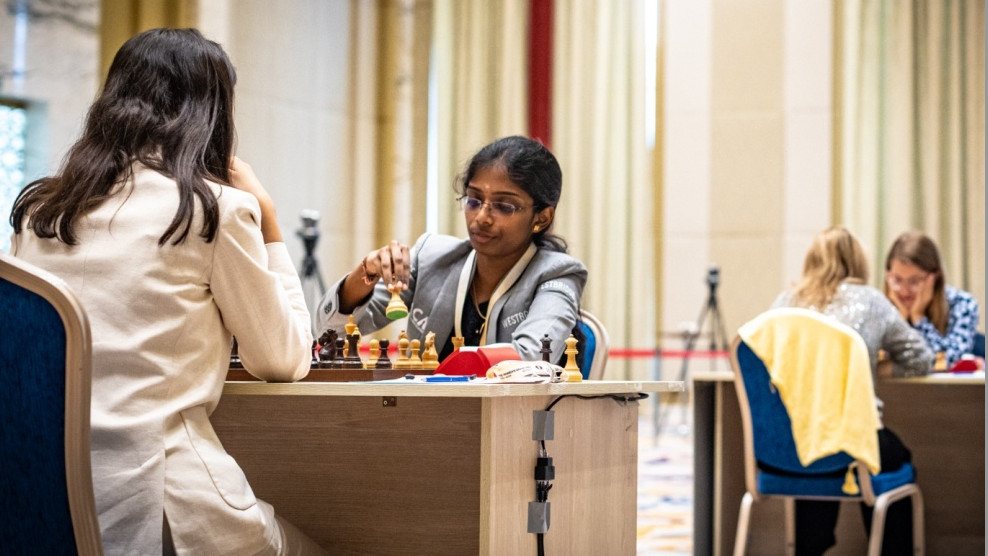
Indian star Vaishali Rameshbabu defeated Sara Khadem with the white pieces in a game she dominated from the very start. With all other games ending in draws, Stavroula Tsolakidou and Bibisara Assaubayeva lead with 2/3, followed by seven players at 50%, and Sara Khadem in last place with half a point. After blundering in round one and then letting a winning position slip away in round two against Alexandra Kosteniuk, Vaishali Rameshbabu secured a victory against Sara Khadem. In a well-executed performance in the Italian Game, Vaishali quickly gained the upper hand and gradually increased the pressure until Black had no choice but to resign. With this victory, Vaishali is on 1.5 points, back in the tournament in style. The first game to finish was between Anna Muzychuk and Alexandra Kosteniuk. In the Morphy Defense of Ruy Lopez both players castled on opposite sides, setting the stage for a potential battle. Muzychuk seemed to have a slight initiative, with Black’s queen stuck on the a7 square and potentially at risk. However, at the critical stage of the game, Muzychuk opted to exchange queens, leading to an even rook endgame. Playing the King’s Indian against Bibisara Assaubayeva, Mariya Muzychuk made a premature pawn advance on the queenside, weakening her position. Fortunately for her, Bibisara made a few inaccuracies, handing the advantage back to Black. After a tactical sequence, White ended up with a queen against two rooks, and the game was drawn. Bibisara is on 2/3, while Mariya Muzychuk has 1.5 points. Stavroula Tsolakidou drew with Lela Javakhishvili in the English Opening. The Greek player shares the lead with Assaubayeva, both on 2/3. The last game of the day to finish was between Nana Dzagnidze and Alina Kashlinskaya. In the English Defense, Kashlinskaya found herself in time trouble but managed to reach the time control and secure a draw. After failing to win significantly better positions in the first two rounds and playing another long game, the pressure is on for Nana Dzagnidze. Standings after Round 3 Here follows a closer look at the games Anna Muzychuk – Alexandra Kosteniuk This game was a clash between two experienced top-class players who have faced each other many times before. Heading into this match, the classical game score between them was 6:5 in favor of Anna Muzychuk, while they were even in Rapid, and Kosteniuk held the edge in the Blitz. In the Morphy Defense of Ruy Lopez, both players castled on opposite sides of the board, setting the stage for a potential sharp showdown. Kosteniuk initiated her attack first, launching a g5-g4 pawn push on move 12, directly challenging the safety of the white king. Muzychuk responded by reinforcing the center and preparing her own counterplay on the queenside. White just played 19.b4, exerting pressure on Black, whose queen was forced to a7. Then, something unusual happened: after 19…Bxe3, White recaptured with the queen on e3, allowing Black to exchange queens, which led to a more central position for Kosteniuk’s remaining pieces. Kosteniuk seized the opportunity and after 20.Qxe3 Qxe3 21.fxe3 Nb6 22.Nxb6 cxb6, the game transitioned into an even rook endgame, effectively defusing the tension on the board. Shortly afterward, the two players agreed to split the point. In the post-game interview, Kosteniuk mentioned that she was unsure about the strength of her position and was relieved when White opted to exchange queens. She added, “I felt I could have played better in the rook endgame,” but overall, she seemed content with her performance. Nana Dzagnidze – Alina Kashlinskaya Kashlinskaya played the English Defense against Nana Dzagnidze. The position after the opening was relatively balanced, with both sides having clear plans. White had slightly more space on the queenside and a strong central pawn on d5, while Black maintained solid central control and active pieces. Eventually, White’s d5-pawn was exchanged for Black’s pawn. Despite Kashlinskaya having an extra pawn, White’s pieces were more active. Black soon returned the extra pawn to activate her pieces. After several exchanges, the game transitioned into a queen and rook endgame. Dzagnidze, significantly better on time, sought to create threats against the Black king. Despite her time trouble, Kashlinskaya defended well and posed counter-threats, ultimately securing a draw. Bibisara Assaubayeva – Mariya Muzychuk Despite both being top players in women’s chess, this was their first classical game against each other, as noted by commentator Keti Tsatsalashvili during the coverage in Tbilisi. Muzychuk opted for the Gruenfeld Defense. The position remained balanced until Bibisara’s premature a-pawn advance weakened her queenside. 17.a4? This was a mistake. 17.Nf3 or 17. dxc5 would have been better, according to the engines. 17…Bc6 18.dxc5 Nxc5 19.Bxg7 Bxg2! 20.Nxg2? Again, White missed the better move 20. Kxg2, which would have kept the game more balanced. After 20…Kxg7, Black was clearly in a better position. Black’s pawns were better protected, and the knights were well-centralized, while White had exposed pawns on the queenside and less piece activity. Additionally, Assaubayeva was under time pressure. However, after 21. Qd4+, Black made a critical error by weakening her pawn structure and light squares with 21…f6. Following 22.Ngf4 Nde4? the position began turning in White’s favor. 23.Qc4 e5 24. b4 exf4 25. bxc5 Nxc5 26. Nxf4 It was White now who had a slightly better position. After move 33, the opponents reached the following position: The best move, according to the engines, was 34.Qb2, maintaining the tension. Instead, Bibisara opted for a tactical sequence. 34.Rxc5 bxc5 35.Ne6! Qxe6 36.cxd4, resulting in Black having two rooks for a queen. Bibisara made these moves under severe time pressure. After a few more moves, it became clear to both players that neither side could make progress, and they agreed to a draw. Stavroula Tsolakidou – Lela Javakhishvili In the English Opening, Tsolakidou, playing White, gained slightly more space on the queenside and established better control over the center, but Black countered effectively. In the middlegame, both players had one weakness each, and the position remained largely even. However, Tsolakidou was
Brazilian Chess Federation advances with bid to host 2030 Chess Olympiad in Brazil

On Wednesday, August 14, 2024, Minister of Sports André Fufuca met with the President of the Brazilian Chess Confederation (CBX), Máximo Igor Macedo, the Advisor to the President of FIDE (International Chess Federation), GM Darcy Lima, and the President of the North Rio Grande do Norte Chess Federation, Máximo Valério Macedo. The group discussed Brazil’s bid to host the Chess Olympiad in 2030, an event of immense importance on the global sports scene. The CBX announced a letter of intent highlighting interested Brazilian states and a possible shared host with Paraguay, which is already in advanced negotiations. The schedule of actions was presented to ensure a solid bid at the correspondent FIDE Congress. Minister André Fufuca acknowledged the event’s great significance and expressed his willingness to analyze the detailed CBX project, taking into account FIDE specifications. He highlighted the need for financial viability but reaffirmed the Ministry’s commitment to supporting the initiative. It will be the first time since 1978 that the Chess Olympiads will return to the American continent, making the Brazilian bid even more meaningful.
FIDE WGP Tbilisi Round 2: A day of unexpected draws
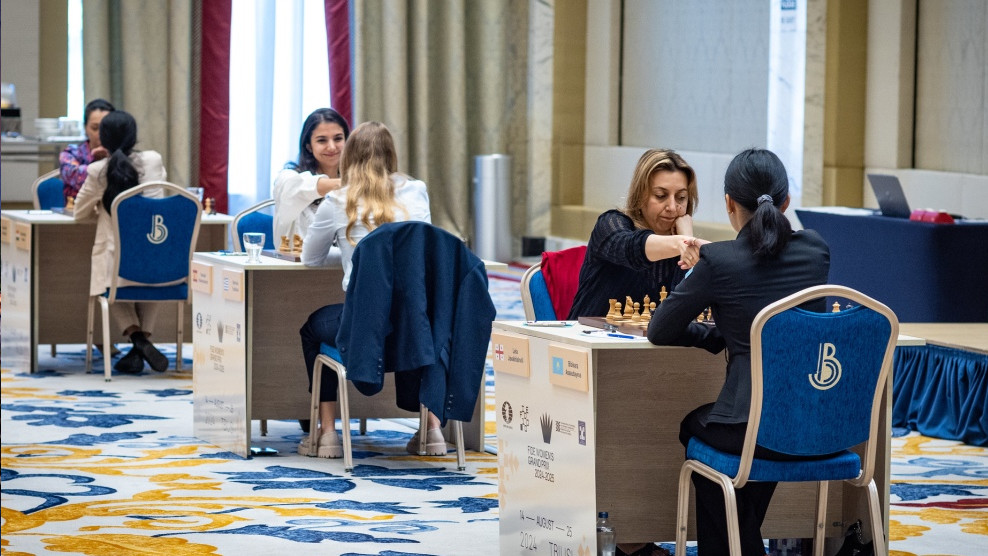
The second day of the Women’s Grand Prix Tbilisi concluded with all games ending in draws. However, in at least two of the games, one side was clearly better and on the brink of victory. After two rounds, Assaubayeva and Tsolakidou remain at the top, each with 1.5 points Vaishali Rameshbabu faced a tough challenge, playing as Black against former Women’s World Champion Alexandra Kosteniuk. After starting the tournament with a loss, Vaishali was under significant pressure on day two. Despite achieving a clearly better position as Black, she opted for a threefold repetition, giving away half a point. The biggest surprises of the day came from the two Georgian players in the tournament, both of whom dropped their winning chances. First, Nana Dzagnidze, playing Black, chose the French Defense and outplayed Mariya Muzychuk in the early stages of the game. Dzagnidze was completely winning towards the end but, in time trouble, opted for simplifications that allowed her opponent to equalize. Upon leaving the playing venue, Dzagnidze was clearly unhappy, shaking her head and remarking, “Unbelievable.” The final game of the day to finish was between Lela Javakhishvili and Bibisara Assaubayeva. Javakhishvili came out of the opening with a better position. After a few mistakes by Assaubayeva, the Georgian player was dominating both on the board and on the clock. However, Assaubayeva maintained her calm resistance, eventually making the first time control and entering a rook endgame where Javakhishvili missed several chances, allowing a draw. It was a lucky save for the Kazakh player, who, with this draw, remained in the shared first place. Sarasadat Khademalsharieh managed to stabilize after her round one loss, drawing as White with Stavroula Tsolakidou in the Nimzo-Indian. Alina Kashlinskaya and Anna Muzychuk also split the point in the Queen’s Gambit Declined, with both playing precisely and not allowing any chances. Standings after Round 2 Here is a closer look at the games from the second day of the Women’s Grand Prix: Alexandra Kosteniuk – Vaishali Rameshbabu After blundering in the first game against Stavroula Tsolakidou, India’s Vaishali Rameshbabu needed to make a comeback. However, it wasn’t going to be easy: she was playing as Black against none other than former women’s world champion Alexandra Kosteniuk. Kosteniuk opened with 1.e4, to which Vaishali responded with 1…e6, entering the Classical line of the French Defense. Vaishali made a push on the queenside and started to grow her initiative. Alexandra has just made a serious error with 29. g4 (instead of reserved 29. Bf2), which failed to a nice combination: 29…Nxe5! White now has to follow: 30.dxe5 Qxg4+ 31.Kf1? (31.Qg2 was slightly better, according to chess engines). And now, Vaishali repeated the moves: 31..Qh3+ 32.Kg1 Qg4+ 33.Kf1 Qh3+ 34.Kf1 Qg4+ Kosteniuk now called the arbiter, who confirmed the repetition. Vaishali should have continued with bringing her knight into the attack with Nh4 on moves 32, 33 and 34, followed by Kg8 with a crushing attack, but she didn’t. After the draw was agreed, the Indian player quickly exited the playing hall. Sarasadat Khademalsharieh – Stavroula Tsolakidou On the second board, Sara Khadem was White against Stavroula Tsolakidou. In the Nimzo-Indian, White was looking to make a push in the center, but Tsolakidou countered. It seemed that Black got out of the opening slightly better, but – in Tsolakidou’s own words, she “wasn’t sure how to proceed”. After exchanging heavy pieces on the kingside, the two entered an endgame with a rook and bishop each and agreed to a draw. With this draw, Tsolakidou is on 1.5/2, while Khadem got her first half a point. Lela Javakhishvili – Bibisara Assaubayeva The last game of the day to finish was between Lela Javakhishvili and Bibisara Assaubayeva. The two played for four and a half hours. In the Queen’s Gambit Declined, the position was even until move 19 when Black (Assaubayeva) made a mistake. Here, Assaubayeva had several options to maintain the balance, but decided to start rerouting her knight from a6. 19…Nc7?, undermining the threats to her king. 20.Rfe1 Nd5 Black got her knight in the center, but at what cost? She was under immense pressure, and the king’s castle was in danger. 21.Nxd5 Bxd5 22.Bxd5 cxd5 23.Qd3 (23.Rac1 might be even stronger), and White is clearly better. Black’s pieces are underdeveloped and the king’s fortress is exposed. As Assaubayeva later said in the post-game interview: “I knew I was weaker, and I tried not to make any more mistakes and see if she can beat me”. Javakhishvili also was better on the clock. Despite this, she started to struggle and could not work out the best way to convert her advantage. After exchanging several heavy pieces, White emerged with an extra pawn on the kingside but in the rook endgame that followed Assaubayeva showed more confidence in her play, bringing the game to a draw. Mariya Muzychuk – Nana Dzagnidze After letting a better position slip in round one, Nana Dzagnidze wanted to set things right in round two. It was a tough task as she was playing as Black against Mariya Muzychuk. In the second French Defence game of the round, things were largely even until move nine when White made an error and prematurely castled on the queenside handing an advantage to Black. Black has control of the center and her pieces are storming down the queenside. White tried to counter on the kingside but ended up even more exposed as Nana timely sacrificed an exchange and reached a very promising position. 10.f5 Rb811.Qe1 b5 12.f6 gxf6 13.Bh6 Kh8 14.exf6 Bxf6 15.Bxf8 Qxf8 16.Qe3 b4 17.Ne2 Black is an exchange down, but she has the initiative, while White’s pieces are still largely undeveloped. However, at this point, Nana started losing her way. 17…b3?? Keeping up the pressure with 17…a5 was the right choice. 18.cxb3 cxb3 19.a3 e5 20.Nc3? e4? Giving White some breathing space. Still, Black is better, and by move 26, she was completely winning. In this position 26…Qe8; Qe7 or Qc5 were all strong
Alireza Firouzja wins 2024 Saint Louis Rapid & Blitz

Alireza Firouzja emerged as the winner of the 2024 Saint Louis Rapid & Blitz. After tying for first place in rapid with Ian Nepomniachtchi and Maxime Vachier-Lagrave, the Iran-born Frenchman delivered an excellent performance in the double round-robin blitz to score 23/36 (11/18 in rapid and 12/18 in blitz) and clinch the title with two rounds to spare. Wesley So netted just 50% (9/18) in rapid but picked up steam in the blitz segment (11/18) to finish second in the standings. The same applies to Hikaru Nakamura, who did a better job in blitz (10.5/18) and took third place. Inversely, Ian Nepomniachtchi and Maxime Vachier-Lagrave, who were in the lead after the rapid part, did not perform as well in the blitz and ended up in 5th and 7th places, respectively. Coming up next is the 2024 Sinquefield Cup, which begins Monday, August 19, with live commentary from GM’s Yasser Seirawan, Peter Svidler, Cristian Chirila and IM Nazi Paikidze starting at 1:20pm CDT. Tune in to the Saint Louis Chess Club’s Twitch & YouTube channels. Official website: grandchesstour.org/ Photos: Saint Louis Chess Club, Lennart Ootes
Assaubayeva and Tsolakidou triumph in first round of the Women’s Grand Prix
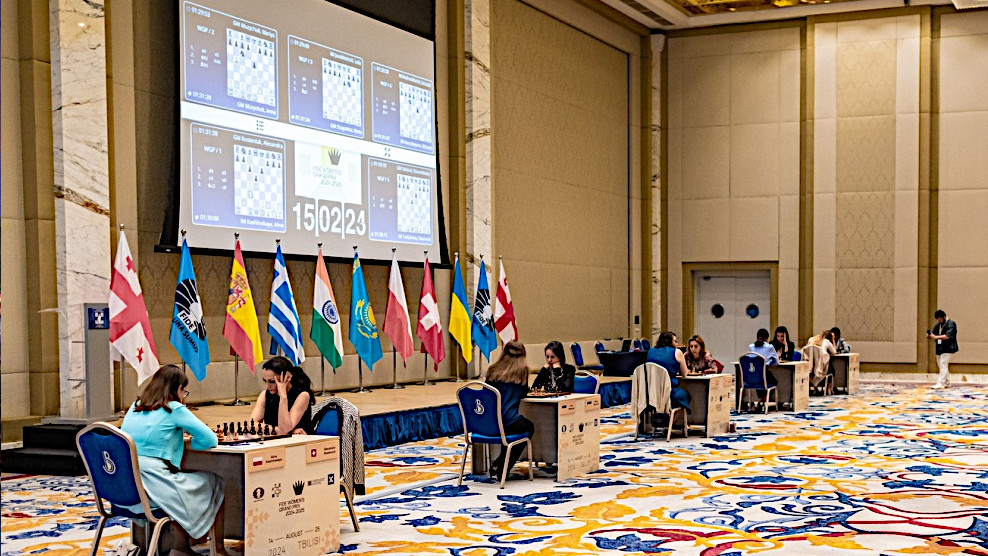
The first round of the first leg of the 2024/2025 Women’s Grand Prix in Tbilisi saw two victories and three draws. Two-time World Blitz Champion Bibisara Assaubayeva defeated Sara Khadem, while Stavroula Tsolakidou stunned Vaishali Rameshbabu after the Indian star misplayed in an even position After the first round Assaubayeva and Tsolakidou lead with one point, followed by six players on half a point – Javakhishvili, Mariya and Anna Muzychuk, Kosteniuk, Kashlinskaya and Dzagnidze. Vaishali and Khadem start the Women’s Grand Prix with losses. The games started at 3 PM sharp in the elegant ballroom of Tbilisi’s prestigious Biltmore Hotel. FIDE Secretary General Lukasz Turlej and Akaki Iashvili, Chair of the FIDE Events Commission and President of the Georgian Chess Association, made the ceremonial first move on the Georgian board. To avoid any chances of foul play, players from the same country were paired against one another, as were the two sisters playing in the event, Anna and Mariya Muzychuk. The game between the Muzycuk sisters was the first to finish. In a very solid line of the Berlin Defense where Anna played as White against Mariya, both sides were equal without much drama happening on the board. The game finished with a threefold repetition on move 21. While the two sisters do play harder against one another if they meet at a later stage of the event, when paired in the first round they usually tend to draw. As they confirmed in the post-game interview, they trained and prepared together, and neither had an opening secret that she did not share with her sibling. In another game, Alina Kashlinskaya and Alexandra Kosteniuk opted for a cautious approach. Kashlinskaya – one of the star members of the Polish Women’s Olympic team – led white pieces against former World Champion Kosteniuk. In the Semi-Slav, White was looking for her chances playing actively, but an early exchange of queens meant that the game entered calm waters. In a rook and knight endgame, neither side wanted to gamble at the start of the event, so they decided to call it a day. The 24-year-old player from Greece, Stavroula Tsolakidou was the first to make a break and score in Tbilisi. On the white side of the English Opening, Stavroula ended up with a pair of bishops and was making threats on the kingside, but the position was even. However, on move 25, Vaishali Rameshbabu completely misplayed. White had more space which gave her some initiative which she was using. Instead of trying to slow White down, Vaishali helped her by exchanging her bishop for a knight on e5, after which she simply lost an exchange and was completely lost. Even as the game progressed, Vaishali missed options to pose more trouble for White, giving Tsolakidou an easy finish. The game between Bibisara Assaubayeva and Sarasadat Khademalsharieh (Sara Khadem) ended with White’s victory. In the Italian, both sides were not playing the most precise moves. Gradually, it was White who grabbed the initiative. Sara (playing as Black) also got into time trouble. On move 19, Bibisara made a Greek offering to Khadem, placing her rook on f6 and creating a towering position for White with 19. Rf6!! Despite this, Assaubayeva went on to drop the advantage in the very next move after 19…Ne7 20. a5? but not for long. Pressure was mounting on Black’s kingside. As Khadem was short on time, Assaubayeva sensed her opportunity. Sara made a mistake giving space for Bibisara to effectively finish the game, after breaking through on the kingside. Both 34. Nxg5 and 34. hxg5 are equally deadly for Black. Bibisara opted to capture with the knight and wrapped it up six moves later. The longest game of the day was between the two home players, Nana Dzagnidze and Lela Javakhishvili. In the Benko Gambit, Dzagnidze got a better position as White. From the onset of the game, Nana seemed more confident – which she was showing on the board and on the clock. Gradually, Dzagnidze was building up a breakthrough in the center. However, at some point, confidence gave way to overconfidence: in a position where White was notably better, Dzagnidze made a hasty exchange which put Javakhisvili back into the game. Dzagnidze just took on e6 with her rook, and Javakhisvili responded with 30…Bd4, hoping to ease the pressure by simplifying. White should have just proceeded by placing her rook to f1, preparing a kingside push. Instead, Nana played 31.Bxd4?! and after 31…cxd4 she made another mistake, 32.Qe4 (Rc6 was key here), after which Black managed to simplify and force a drawn rook endgame. Clearly upset, Dzagnidze decided to push on in a slightly better position. Making such a gambit this early in the race is a big risk, but Dzagnidze felt her confidence was still there. Gradually, White inched her way ahead but missed her last chance to pose very serious problems for Black on move 53 (53. Rd5+ instead of 53. h5?). The game ended in a draw after just over five hours of play and 66 moves. Nana Dzagnidze must be unhappy after dropping this chance. It remains to be seen if she will be able to recover in time for the second round. Round two pairings and dates The second round of the first tournament in the 2024/25 Women’s Grand Prix series starts on Friday, 3 PM local time in Tbilisi, Georgia. Round 2 pairings: Alexandra Kosteniuk – Vaishali RameshbabuSarasadat Khademalsharieh – Stavroula TsolakidouLela Javakhishvili – Bibisara AssaubayevaMariya Muzychuk – Nana Dzagnidze Alina Kashlinskaya – Anna Muzychuk More information about the event, including the regulations and details of the pairings, as well as live game can be found on the official website: womengrandprix.fide.com/. Written by Milan Dinic Photos: Anna Shtourman
FIDE World Championship Match to be held in Singapore at Resorts World Sentosa

Singapore, August 15, 2024 – The Singapore Chess Federation (SCF) is thrilled to announce that the FIDE World Chess Championship 2024 match will take place in Singapore for the first time at Resorts World Sentosa (RWS) from November 23 to December 15, 2024. This iconic event will be the first in 138 years to feature two contestants from Asia between the reigning World Champion, China’s Ding Liren and challenger Dommaraju Gukesh from India competing for the title. RWS, globally renowned for its luxurious facilities and world-class hospitality, will provide the perfect backdrop for this high-stakes match. Singapore’s first integrated resort offers a distinctive blend of diverse leisure and entertainment options, where players, officials, and fans alike can look forward to having a memorable experience. “We are privileged to partner RWS in hosting the Championship, and we look forward to witnessing the intricacies of this match unfold against the backdrop of an exceptional integrated resort,” said Mr Kevin Goh, SCF CEO and Chair of the Local Organising Committee. “This partnership preserves the prestige of the FIDE World Chess Championship while introducing an element of modernity and excitement – visitors can enjoy the luxury of having many attractions a stone’s throw away from the match venue to complement the existing suite of ancillary chess events.” Ms Lee Shi Ruh, RWS President, said: “Chess is a strategic and intellectual game that has been enjoyed for centuries and played by millions around the world. RWS is excited to welcome the FIDE World Chess Championship 2024 match and its fans from across the globe as a silver sponsor. RWS is home to a variety of world-class events that cater to a different passion – just as the game of chess is renowned for its depth and ingenuity, RWS presents a diverse range of offerings with something for everyone. Our collaboration with the SCF captures the very essence of RWS as a top-notch MICE destination for lifestyle and entertainment, and also further presents Singapore’s overall attractive appeal as a premier global hub for international sports and cultural events.” Looking ahead, visitors to RWS can also anticipate exciting blockbuster events as well as new developments, including all-new attractions, hotels, retail and dining, significantly elevating its appeal as a top lifestyle resort. Speaking about the partnership, Goh said: “We are looking for more like-minded enterprises to partner us in delivering a world-class event and showcasing the many benefits of chess. Chess is an intellectual sport that involves strategic thinking, discipline and resilience. These are values that many organisations would be aligned with.” In conjunction with the match, there will be a top-level open tournament held within minutes of the playing hall of the match. Organised by the SCF, the Singapore International Open will feature competitors from all over the world – including our very own from Singapore. “It’s amazing that I will not only be able to witness the World Championship match up close but also compete in a strong international tournament in my own country,” said local grandmaster Siddharth Jagadeesh (pictured above), who at 17 is Singapore’s youngest ever grandmaster. Tickets for the FIDE World Chess Championship Match will go on sale soon. There will also be extensive live coverage and commentary across multiple platforms, ensuring that the excitement reaches a global audience. For media enquiries, please contact press@fide.com Contact for sponsorship opportunities: marketing@fide.com For more information about the Singapore International Open, go to https://www.sgchessfestival.com
All eyes on Tbilisi as Women’s Grand Prix spectacle begins
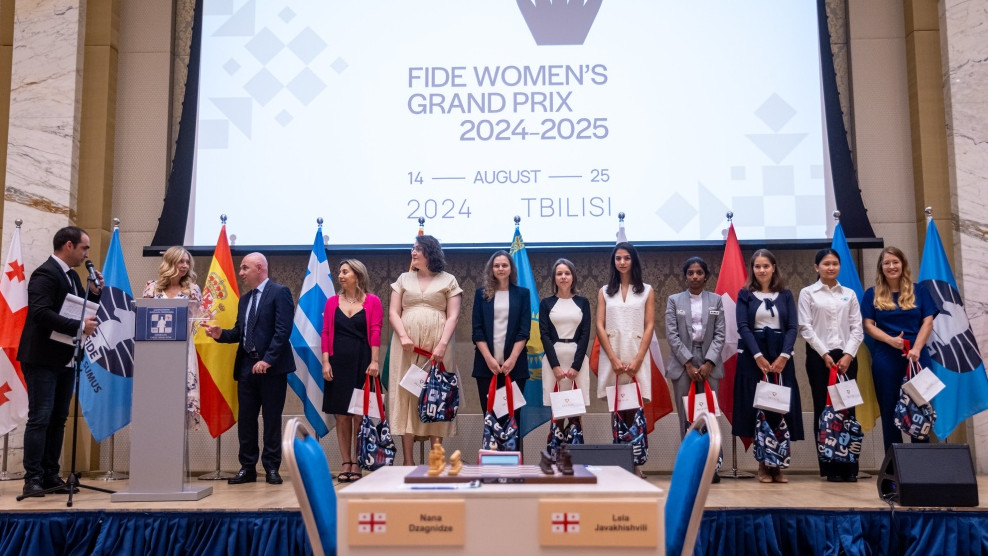
At 3 PM local time on August 15, Georgia will become the epicenter of the chess world for the next 10 days, as elite women Grandmasters embark on an intense competition that will extend into the coming year. The ballroom of Tbilisi’s iconic Biltmore Hotel, typically a venue for balls and conferences, will transform into a battlefield where women’s and world chess history will be made. All but one of the players was present on stage at the opening – Alexandra Kosteniuk was absent as her flight was delayed and she could not make it in time. “Chess, Friends, and Love” The night before, the grandees of the Georgian chess world gathered at the same venue for the official opening ceremony. Among the 70 distinguished guests were many notable figures from Georgian chess, as well as prominent public figures, officials from the Georgian government and FIDE officials, including five-time Women’s World Champion Nona Gaprindashvili, FIDE CEO Emil Sutovsky, FIDE Secretary General Lukasz Turlej, FIDE Continental President for Europe Zurab Azmaiparashvili and FIDE Special Tasks Director Akaki Iashvili. As the FIDE Official and Chair of the Appeal Committee Sava Stoisavljevic put it – “Georgia can be described in three words: chess, friends and love”, and the opening ceremony showed all three. The hospitality extended by the Georgians was second to none. From the moment the players, officials, and special guests arrived in Georgia, they were treated like Hollywood stars—whisked into limousines straight from the airplane, with their passports and luggage handled for them, receiving true VIP treatment. The opening ceremony continued in the same grand fashion. It was hosted by Giorgi Chanishvili, one of Georgia’s most famous sports journalists, also known as “the voice of Judo” in a country where the sport is incredibly popular. In fact, the ceremony began with the Georgian Chess Federation congratulating the Georgian Olympic squad, who—despite numbering only 28 athletes—achieved an outstanding feat at the Paris Olympics by winning three golds, three silvers, and one bronze medal, surpassing many larger nations and marking one of the greatest sporting successes in Georgia’s history. Akaki Iashvili opened the ceremony and greeted all the participants. “We all know that Georgian chess is rich in tradition. I believe the Georgian Chess Federation and FIDE will implement the highest level of the event. I would like to extend my gratitude to all the foreign participants who arrived in our beautiful city, the capital of Georgia,” he said. Nona Gapridashvili and Zurab Azmaiparashvili expressed similar sentiments in their short speeches. Then FIDE Secretary General General Lukasz Turlej took the stage: “It is a wonderful opportunity to be here in Georgia. The Georgian Chess Federation is one of the strongest partners of FIDE. It has an amazing history of many successful events, and I am sure this one will be no exception.” After the performance of the Georgian national anthem, the participants were invited to the stage to receive memorable gifts. There is no better place than Georgia to launch the new season of the Women’s Grand Prix. As the birthplace of chess legends like former Women’s World Champions Nona Gaprindashvili (the first woman to be awarded the title of Grandmaster) and Maia Chiburdanidze, as well as three-time Soviet Women’s Champion Nana Alexandria, Georgia holds a revered place in chess history. The country continues to produce world-class talent, including Nana Dzagnidze, Nino Batsiashvili, Lela Javakhishvili, and Bella Khotenashvili, making it a fitting host for this landmark event. The tournament in Tbilisi, a ten-player round-robin, is taking place at the luxurious Biltmore Tbilisi Hotel – the first glass skyscraper in Georgia and the highest hotel in the Caucasus Region. This inaugural event is a good mix of local players, talented youngsters and experienced GMs, including two former Women’s World Champions — Alexandra Kosteniuk, winner of the Munich leg in the 2022/23 series, and Mariya Muzychuk. The first round starts on Thursday, 3 PM local time. The time control will be 90 minutes for the first 40 moves, followed by 30 minutes for the rest of the game, with an increment of 30 seconds per move starting from move one. Round 1 pairings: Kashlinskaya, Alina – Kosteniuk, AlexandraMuzychuk, Anna – Muzychuk, MariyaDzagnidze, Nana – Javakhishvili, LelaAssaubayeva, Bibisara – Khademalsharieh, SarasadatTsolakidou, Stavroula – Vaishali, Rameshbabu Photos: Anna Shtourman Official website: womengrandprix.fide.com/

